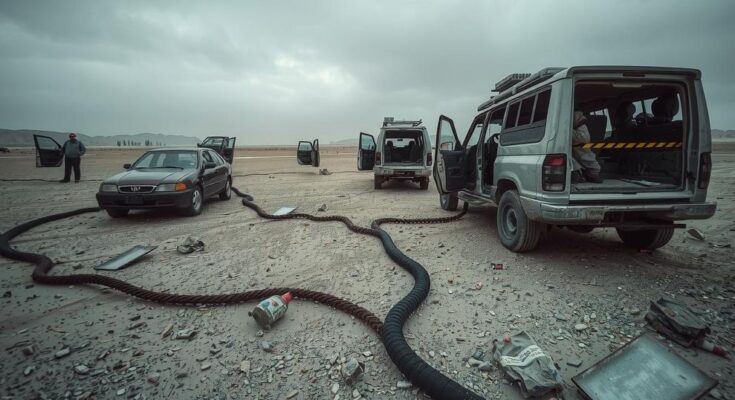The DRC faces a severe escalation of violence, with the M23 rebel group capturing Goma and threatening to advance toward Kinshasa. Tensions are rising as the Congolese government calls for mobilization against what it deems a Rwandan declaration of war. The conflict risks destabilizing a region rich in minerals essential for global electronics, while international responses are mixed, raising concerns about geopolitical influences.
The Democratic Republic of Congo (DRC) is currently facing a severe resurgence of violence, with the rebel group M23 making significant territorial gains. The ongoing conflict, rooted in decades of discord, has escalated dramatically, prompting the United Nations to issue warnings about the potential for widespread war. M23’s recent capture of the strategic city of Goma has raised alarms, with its leaders ambitiously aiming to extend control all the way to the capital, Kinshasa.
President Félix Tshisekedi’s administration has termed this offensive a direct challenge from Rwanda, asserting that local citizens face dire humanitarian conditions, including corpses in the streets and shortages of basic services. The escalation is particularly alarming given the region’s history of violence, resulting in millions of deaths across previous conflicts. The situation has led to the displacement of over 400,000 individuals in a single month, highlighting the urgent need for international intervention.
International reactions have been varied, with heightened attention from the U.S. and Europe. France has expressed concern, meeting with Congolese leadership to discuss the conflict’s ramifications. There is growing apprehension that a muted response from Western nations may open the door for increased influence from countries like China and Russia, which could shift the balance of power in the region.
M23 is predominantly comprised of ethnic Tutsi seeking to assert their rights amidst a Hutu-majority landscape, a struggle rooted in historical conflicts stemming from the Rwandan genocide. Although the group claims to be defending the Tutsi community, allegations of Rwandan military support complicate the situation, with Rwanda categorically denying these claims. The ongoing violence has rekindled fears of a larger regional conflict.
The DRC is crucial for global supply chains due to its vast mineral wealth, particularly cobalt, which is essential for electronics production. While the conflict is severe, the immediate risk to mineral supply lines is currently assessed as low. However, with armed militia groups proliferating in the region, the potential for instability remains a significant concern for international stakeholders.
Additionally, while Rwanda has gained economic and strategic significance in Africa, its support for M23 raises questions about the international community’s stance. Although some Western nations are reconsidering their alliances with Rwanda, the flow of aid to Rwanda continues, suggesting a complex interplay of geopolitics that underpins the ongoing conflict in the DRC.
This latest episode of violence underscores the DRC’s precarious situation and the necessity for a coordinated, global response to avert further deterioration. With a historical context of conflicts yet unresolved, it is essential that actions be taken to restore peace and stability in the region.
The Democratic Republic of Congo has suffered from prolonged conflicts since gaining independence from Belgium in 1960. The resurgence of the M23 rebel group, with strong ties to Rwanda, threatens to escalate the ongoing crisis, risking regional warfare. The DRC’s wealth of minerals, including cobalt, adds complexity to the conflict, drawing international interest and involvement. The humanitarian implications are dire, with significant civilian displacements and casualties occurring amidst the chaos.
In summary, the DRC is experiencing a resurgence of violence driven by the M23 rebel group’s ambitions and historical tensions complicating the situation. An urgent call for international action is required to stabilize the region, as the conflict directly impacts global supply chains and humanitarian conditions. The interplay of local ethnic grievances and international geopolitical interests further complicates the landscape, necessitating a strategic approach to foster peace and security in the DRC.
Original Source: www.nbcnews.com




